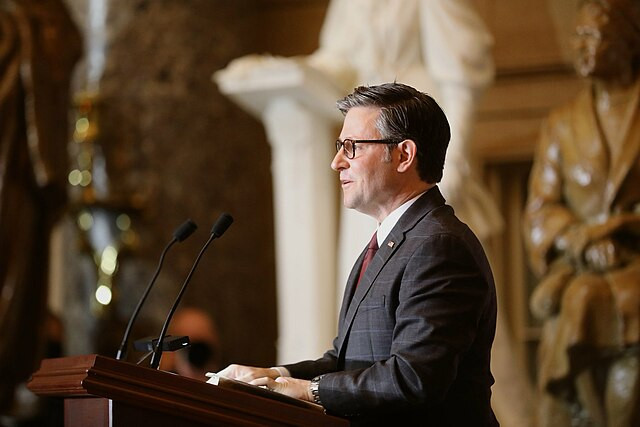House Republicans are bracing for a potential setback as Speaker Mike Johnson's plan to avert a government shutdown teeters on the edge of collapse. With less than three weeks remaining before the federal government is set to run out of funding, Johnson's proposal, which ties a six-month funding extension to the controversial SAVE Act, faces mounting opposition from within his own party.
The looming defeat is a significant challenge for Johnson, who has tied his political fortunes to the passage of this legislation. The SAVE Act, which would require proof of citizenship for voter registration, has drawn the support of former President Donald Trump, but it has also sparked resistance from both conservative rebels and defense hawks within the GOP. These factions have expressed concerns over the potential impact of the bill on the military and the broader economy.
The bill's opponents, including Representatives Cory Mills of Florida and Tim Burchett of Tennessee, argue that continuing resolutions (CRs) are a symptom of fiscal irresponsibility. "I've continuously voted against CRs. I think it is terrible legislating," Burchett stated in an interview, reflecting a broader sentiment among fiscal conservatives who see CRs as a temporary fix that exacerbates long-term financial issues. Mills, who serves on the Armed Services and Foreign Affairs committees, warned that the proposed CR could weaken the U.S. defense posture at a critical time. "This CR would weaken our defense capabilities and the readiness of our military, just as global threats are rapidly evolving," he said in a statement.
Adding to the complexity, Trump has insisted that any government funding measure must include the SAVE Act, using his social media platform to urge Republicans to hold the line. "If Republicans in the House, and Senate, don't get absolute assurances on Election Security, THEY SHOULD, IN NO WAY, SHAPE, OR FORM, GO FORWARD WITH A CONTINUING RESOLUTION ON THE BUDGET. ... CLOSE IT DOWN!!!" Trump wrote, signaling his willingness to see a shutdown if his demands are not met.
The potential collapse of Johnson's plan highlights the deep divisions within the Republican Party, particularly as it faces the dual pressures of maintaining government operations and addressing election security concerns. The situation is further complicated by the Senate, where Majority Leader Chuck Schumer and other Democrats have been pushing for a clean funding bill that would keep the government open until after the upcoming election. With the government set to shut down at 12:01 a.m. on October 1st if no agreement is reached, the stakes are high for both parties.
As of Wednesday, the bill appears unlikely to pass in the House, with at least eight Republicans publicly opposing it-a number that exceeds the GOP's narrow margin of error in the chamber. The Biden administration has also indicated that the president would veto the bill if it reached his desk, citing concerns over its implications for voter access and the broader economy.
The growing opposition has left Johnson in a precarious position, with no clear path forward. Some GOP leaders have suggested that the bill may be pulled before it even reaches a vote, acknowledging that its defeat could be a major embarrassment for the party. Others believe that Johnson may need to allow the bill to fail in order to gain political cover to pursue a clean funding measure that could pass with bipartisan support.
Yet, the pressure from Trump complicates this potential shift. Should Johnson pivot to a clean CR without the SAVE Act, he risks further alienating the right flank of his conference, which has already expressed frustration with the current state of affairs. Johnson has attempted to downplay the rift, insisting that he and Trump are on the same page. "I think President Trump is saying exactly what I have been saying, and that is we need assurances on election security and to fund the government," Johnson told CNN's Jake Tapper.
However, the reality on the ground suggests otherwise. With no Plan B currently in place, House Republicans face the daunting task of finding a solution that satisfies both their internal factions and the broader political landscape. As the shutdown deadline looms, the clock is ticking for Johnson and his allies to navigate this legislative minefield and prevent a government closure that could have far-reaching consequences.





